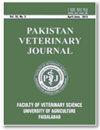Phytochemical Analysis and In Vitro Activity of Essential Oils of Selected Plants against Salmonella enteritidis and Salmonella gallinarum of Poultry Origin
IF 5.4
3区 农林科学
Q1 VETERINARY SCIENCES
引用次数: 16
Abstract
Received: Revised: Accepted: Published online: July 17, 2019 August 25, 2019 September 09, 2019 October 24, 2019 Antibiotic resistant Salmonella is a major threat to poultry industry and public health. Medicinal plants are an effective alternative of antibiotics for the control and treatment of multiple drug resistant Salmonella. The objective of this study was to evaluate the in-vitro activity of essential oils of some medicinal plants against multiple drug resistant Salmonella of poultry origin and to determine their active ingredients. Essential oils of Cuminum cyminum, Cinnamomum zeylanicum, Eucalyptus globulus, Allium sativum and Nigella sativa were prepared by steam distillation and their active ingredients were determined by Gas ChromatographyMass Spectrometry (GC-MS) analysis. Activity of oils against Salmonella enteritidis (n=05) and Salmonella gallinarum (n=05) was determined by well diffusion assay. Broth microdilution assay was employed to determine the minimum inhibitory concentrations of oils. Well diffusion assay revealed that C. zeylanicum and E. globulus had better activity against salmonellae (26±7.6 mm and 16±6.8 mm, respectively) as compared to C. cyminum, A. sativum and N. sativa (8±5.9, 10±6.1, 8±4.7 mm, respectively). Minimum inhibitory concentrations of C. zeylanicum and E. globulus against Salmonella were 64.1±32.1 and 68.9±32.9 μg/mL, respectively. The GC-MS analysis revealed presence of diverse phytochemicals in all essential oils. Major antimicrobial phyto-constituents of essential oils of E. globulus and C. zeylanicum were eucalyptol (82.85%) and 1R-α-Pinene (13.781%), and cinnamaldehyde (64.14%) and eugenol (8.9%), respectively. It is concluded that essential oils of C. zeylanicum and E. globulus have excellent in vitro antiSalmonella activity. It is insinuated that these extracts may be commercialized as an alternative of antibiotics for the control of Salmonellae in poultry after detailed in vivo evaluations. ©2019 PVJ. All rights reserved部分植物精油对家禽源肠炎沙门氏菌和鸡源沙门氏菌的体外活性及植物化学分析
收到:修订:接受:在线发布:2019年7月17日2019年8月25日2019年9月09日2019年10月24日抗生素耐药性沙门氏菌是对家禽业和公众健康的重大威胁。药用植物是控制和治疗多重耐药沙门氏菌的有效替代抗生素。本研究的目的是评价几种药用植物精油对禽源多重耐药沙门氏菌的体外活性,并确定其有效成分。采用水蒸气蒸馏法制备了Cuminum cyminum zeylanicum、Eucalyptus globulus、Allium sativum和Nigella sativa精油,并采用气相色谱-质谱(GC-MS)分析方法对其有效成分进行了测定。采用孔扩散法测定精油对肠炎沙门氏菌(n=05)和鸡沙门氏菌(n=05)的活性。采用微量肉汤稀释法测定油脂的最低抑菌浓度。孔扩散试验结果表明,zeylanicum和E. globulus对沙门氏菌的抑菌活性(分别为26±7.6 mm和16±6.8 mm)优于C. cyminum、A. sativum和N. sativa(分别为8±5.9、10±6.1和8±4.7 mm)。zeylanicum和globulus对沙门氏菌的最低抑制浓度分别为64.1±32.1和68.9±32.9 μg/mL。GC-MS分析显示,所有精油中均含有多种植物化学物质。黄姜和黄姜精油的主要抑菌成分为桉油醇(82.85%)和1R-α-蒎烯(13.781%),肉桂醛(64.14%)和丁香酚(8.9%)。综上所述,莪术挥发油和球孢挥发油具有较好的体外抗沙门氏菌活性。据推测,经过详细的体内评价,这些提取物可能作为抗生素的替代品用于控制家禽沙门氏菌的商业化。©2019 PVJ。版权所有
本文章由计算机程序翻译,如有差异,请以英文原文为准。
求助全文
约1分钟内获得全文
求助全文
来源期刊

Pakistan Veterinary Journal
兽医-兽医学
CiteScore
4.20
自引率
13.00%
发文量
0
审稿时长
4-8 weeks
期刊介绍:
The Pakistan Veterinary Journal (Pak Vet J), a quarterly publication, is being published regularly since 1981 by the Faculty of Veterinary Science, University of Agriculture, Faisalabad, Pakistan. It publishes original research manuscripts and review articles on health and diseases of animals including its various aspects like pathology, microbiology, pharmacology, parasitology and its treatment. The “Pak Vet J” (www.pvj.com.pk) is included in Science Citation Index Expended and has got 1.217 impact factor in JCR 2017. Among Veterinary Science Journals of the world (136), “Pak Vet J” has been i) ranked at 75th position and ii) placed Q2 in Quartile in Category. The journal is read, abstracted and indexed internationally.
 求助内容:
求助内容: 应助结果提醒方式:
应助结果提醒方式:


